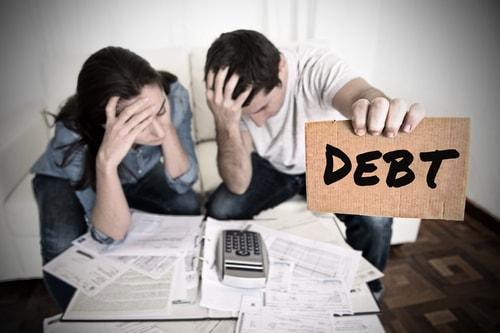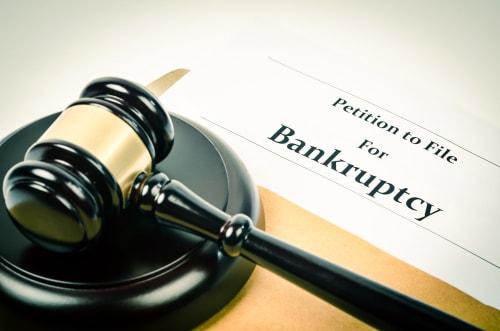Recent Blog Posts
The Role of a Bankruptcy Trustee
 Coming to the decision that your best option is to file for bankruptcy is not easy. You may have taken weeks, if not months to realize that your best option is bankruptcy. The bankruptcy process can be confusing because of all of the legalities and people involved with the process. When you file for bankruptcy, the United States Trustee Program will assign you a bankruptcy trustee who will be responsible for overseeing your case. The trustee is one of the most important people in your case, so it is crucial that you understand the role of the trustee and the impact the trustee can have on your case.
Coming to the decision that your best option is to file for bankruptcy is not easy. You may have taken weeks, if not months to realize that your best option is bankruptcy. The bankruptcy process can be confusing because of all of the legalities and people involved with the process. When you file for bankruptcy, the United States Trustee Program will assign you a bankruptcy trustee who will be responsible for overseeing your case. The trustee is one of the most important people in your case, so it is crucial that you understand the role of the trustee and the impact the trustee can have on your case.
What Is a Bankruptcy Trustee?
The role of a trustee was created to prevent the creditors and courts from having to be the ones responsible for collecting and distributing the property of those who file for bankruptcy. Trustees are independent contractors who are not employees of the bankruptcy court, but they must answer to the court and cannot take any kind of action until the court approves it. The trustee will evaluate and make recommendations pertaining to the demands of different debtors involved in the specific bankruptcy case they are assigned to.
Keep Your Vehicle through Cramdown
If you can’t afford to pay your vehicle payments even after writing off your other debts under Chapter 7, consider a Chapter 13 loan cramdown.
The last two blog posts have been about keeping your vehicle in a Chapter 7 case. Two weeks ago was about the benefits of reaffirming the vehicle’s loan. Last week was about possible ways of keeping the vehicle by making the loan payments but not reaffirming. These all assumed that you would keep on making the full monthly payments in order to keep the vehicle.
But what if you can’t afford the full monthly payments? Are there any other options if, even after getting rid of your other debt, you can’t pay the vehicle payments?
The answer: you may be able to reduce the vehicle payments through Chapter 13 cramdown. In fact, you may be able to significantly reduce the payments. And cramdown may give you some other huge financial benefits.
Reducing Monthly Payments through Cramdown
Keep Your Vehicle without Reaffirmation
Can you keep your vehicle without reaffirming its loan? Can you make the payments without reaffirming? What if you can’t afford the payments?
Last week we discussed keeping your vehicle in Chapter 7 by entering into a reaffirmation agreement with your vehicle lender. Through this agreement you exclude your vehicle loan from the discharge of debts. In return you get to keep your vehicle. You also get an early start on rebuilding your credit by making payments on and eventually paying off this loan.
We ended last week with two unanswered questions:
- Would you be able to keep your vehicle in a Chapter 7 case if you DIDN’T sign a reaffirmation agreement but just kept current on your payments and insurance?
- Are there any other options if you couldn’t afford the vehicle payments even after discharging your other debts?
We cover the first question today, the second one next time.
Risks to Avoid If You Can
Keep Your Vehicle by Reaffirming its Loan
If you want to keep your vehicle and still pay on its loan, file a Chapter 7 case to write off other debts and reaffirm the vehicle loan.
A Vehicle Loan is a Secured Debts
We started this series of blog posts on debts by introducing secured debts as follows:
Each of your debts is either secured by something you own or it is not. A secured debt is backed up by a lien, a legal interest of the creditor in some kind of property of yours. See Section 101(37) of the U.S. Bankruptcy Code.
Usually you know whether a debt is secured. For example, in the case of a vehicle loan the vehicle’s title states that your lender is the lienholder. That lien on the title makes the loan secured by the vehicle. That, together with the security agreement you signed, gives the lender certain rights over your vehicle.
What Not to Do Before Filing for a Texas Bankruptcy
 For many people who have quite a bit of debt, bankruptcy is the best option. There are two types of bankruptcies that individuals can file for in the United States -- Chapter 7 and Chapter 13 bankruptcies. A Chapter 7 bankruptcy is one that discharges most of your debt and leaves you with a blank slate so you can rebuild your finances. A Chapter 13 bankruptcy is basically a reorganization of your debts -- you work with your debtors to come up with a repayment plan that works for you. In either of these scenarios, there are certain things that are big no-no’s. It is important that you avoid these common mistakes when filing for a Texas bankruptcy:
For many people who have quite a bit of debt, bankruptcy is the best option. There are two types of bankruptcies that individuals can file for in the United States -- Chapter 7 and Chapter 13 bankruptcies. A Chapter 7 bankruptcy is one that discharges most of your debt and leaves you with a blank slate so you can rebuild your finances. A Chapter 13 bankruptcy is basically a reorganization of your debts -- you work with your debtors to come up with a repayment plan that works for you. In either of these scenarios, there are certain things that are big no-no’s. It is important that you avoid these common mistakes when filing for a Texas bankruptcy:
Lying or Withholding Information from Your Attorney
Though it may seem beneficial to lie or hide certain assets from your attorney, it is quite the opposite. It is against the law to attempt to hide assets or omit them from your list of assets that you submit to the bankruptcy court. Not only could your bankruptcy case be rejected, but you can also face criminal charges related to bankruptcy fraud.
Forgotten Debts
What do you need to do, what efforts is worth taking, if there are debts you don’t have any records on or you’ve forgotten about?
Several blog posts ago we introduced the law that debts “neither listed nor scheduled” risk not being forgiven in bankruptcy. Section 523(a)(3) of the Bankruptcy Code. This follows the bankruptcy principle that debts are forgiven—“discharged”—unless a debt fits within a specific exception. Debts “neither listed nor scheduled” is one of the exceptions.
Related to this exception to discharge we’ve recently looked at:
- how to add a debt after filing your case that you didn’t originally list, and your timing for doing so
- an exception to this discharge exception, that is, your unlisted creditor’s debt still being discharged if it still finds out about your case, and does so on time
Debts Sold or Assigned to Collection Agencies
What happens if you list a creditor in your bankruptcy case but, unknown to you, it sold the debt to a collection agency that you don’t list?
Our blog post two weeks ago was about needing to list all your debts in a bankruptcy case in order to write them off. This is part of a series of blog posts about debts that may not get discharged (written off) in bankruptcy. The law says that bankruptcy does not discharge debts that are “neither listed nor scheduled” in the bankruptcy documents. Section 523(a)(3) of the Bankruptcy Code.
Special Scenarios
This raises some practical questions, including the following:
- Is a debt covered if you don’t list it but the creditor still learns about your bankruptcy case?
- What happens if you list the creditor but it had previously sold the debt to a collection agency?
- What do you do if you don’t know all of your debts because you’ve moved or lost track of them for some other reason?
Creditor Not Listed But Knows about Your Case
Usually if you don’t list a debt, it doesn’t get discharged. An exception is if the creditor still learns about your case, on time.
Last week’s blog post was about the importance of listing all debts in a bankruptcy case to write them off. Debts “neither listed nor scheduled” in the bankruptcy documents are not discharged (legally written off). Section 523(a)(3) of the Bankruptcy Code.
Special Scenarios
This rule raises a number of practical questions. Here are some common situations:
- You don’t list a debt but the creditor finds out about your bankruptcy some other way.
- Your debt has been sold or assigned to a collection agency without your knowledge
- You don’t have good records of your debts and you may not know some of their names and addresses.
Today we address the first of these.
Creditor Knows About Your Bankruptcy Case
Debts You Don't List in Your Bankruptcy Case
If you don’t list a debt in your bankruptcy case, and don’t add it in on time, it may not be written off. So carefully include all debts.
Supposed to List All Creditors
You can’t pick and choose which debts to include in your bankruptcy case. The U.S. Bankruptcy Code says that the first duty of a bankruptcy debtor is to provide “a list of creditors.” Section 521(a)(1) of Bankruptcy Code. That list includes secured, priority, and unsecured debts, which you put on Schedules D, E and F, respectively. As these Official Forms state clearly, you must
- “List All Secured Claims”
- “List All of Your Priority Unsecured Claims”
Things You Should Know Before You File for Bankruptcy
 Most Americans have some form of debt -- mortgages, credit card debt, student loans, auto loans, and personal loans are all part of consumer debt and most Americans have a combination of them. For many people, the debt can be handled through smart budgeting and curbed spending, but some people need to use other measures. Bankruptcy is used when people can no longer pay their debt and offers a way for those in debt to get a fresh start. The decision to file for bankruptcy is a difficult one, especially since bankruptcy laws are so complex. Here are a few things you should know before you file for bankruptcy:
Most Americans have some form of debt -- mortgages, credit card debt, student loans, auto loans, and personal loans are all part of consumer debt and most Americans have a combination of them. For many people, the debt can be handled through smart budgeting and curbed spending, but some people need to use other measures. Bankruptcy is used when people can no longer pay their debt and offers a way for those in debt to get a fresh start. The decision to file for bankruptcy is a difficult one, especially since bankruptcy laws are so complex. Here are a few things you should know before you file for bankruptcy:
There Is More Than One Kind of Bankruptcy
For individuals, there are two different types of bankruptcies -- Chapter 7 and Chapter 13. A Chapter 7 bankruptcy is the type that most people associate the word bankruptcy with. In Chapter 7 bankruptcy, most of your unsecured debts can be discharged, meaning you will no longer be responsible for paying them back. In a Chapter 13 bankruptcy, you set up a repayment plan that allows you to repay your debts over three to five years. The kind you choose largely depends on your specific circumstances.






